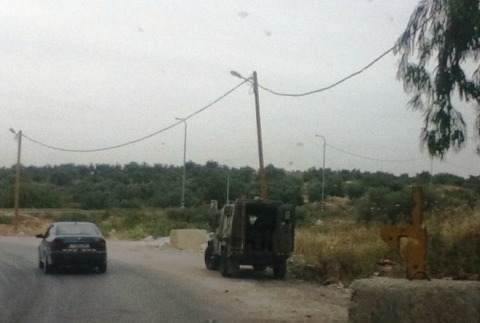7th May 2014 | International Women’s Peace Service | Azzun, Occupied Palestine
If the people of ‘Azzun seem nervous, they have a right to be. The town (population approximately 10,000) sits on crossroads – Qalqiliya is to the west, Nablus to the east, Salfit to the south and Tulkarem to the north. This is a junction that is vulnerable to road closures and flying checkpoints. On either side, the illegal settler colonies of Ma’ale Shomeron and Alfe Menashe loom large. Six Israeli surveillance cameras surround ‘Azzun, meaning that the population is being watched all day, every day.
Because of its precarious geographical position, occupation forces have been particularly brutal in ‘Azzun. Currently, 230 Palestinian children are imprisoned in Israel jails. 68 of those children come from ‘Azzun. There are an additional 112 adult prisoners from here, victims of regular night raids. In 2013, the Israeli military conducted 300 operations inside the town, and soldiers have entered the town on foot every night for the last week.
Those who are not imprisoned face other difficulties. Most of the population are professional farmers; however most of the town’s land has been stolen by the surrounding settlements. This has left ‘Azzun with a 46% unemployment rate. Many of the employed work across the Green Line, facing regular harassment at the checkpoints. During the Second Intifada, checkpoint gates were installed at the entrances of the town, enabling the Israeli military to create flying checkpoints, which happens multiple times per week.
Such was the case yesterday, when 8 jeeps arrived at 1 pm to close the gate leading to road 55 which runs from Qalqilya towards Nablus. After the soldiers arrived, several of them entered the village and grabbed Osama, a nine year old boy, seemingly at random. The soldiers told the surrounding villagers that they arrested Osama because he had been seen throwing rocks immediately prior to their arrival. Eyewitnesses from ‘Azzun refuted this claim, saying that they had seen the boy playing with his friends in the town square at the time when the rocks were allegedly thrown. Regardless, the soldiers detained Osama in the back of one jeep, and did not allow any Palestinians to sit with the boy, even though he was crying and visibly distressed. The boy’s father arrived quickly, but since he did not have his Hawiyya ID card on him, he was forced to go home and retrieve it before he was allowed to see his son. Osama was alone with the soldiers in the jeep for over one hour, and remained in detention for another hour and a half after his father returned, before being released. Throughout this time, people from the town surrounded the military jeeps, in an effort to support the child. The incident was captured by Palestine TV, and can be seen below. The offending soldiers released Osama to his home that night, but claimed that he had officially confessed to throwing stones.
Often, ‘Azzunee children who are arrested or detained are offered release if they sign a confession, often written in Hebrew, a language they don’t read or write. These children are usually alone with soldiers, with neither their parents nor lawyers present (which is in direct contravention of Israel’s own laws), and are under great physical and mental duress. These confessions are designed to implicate other children – often by having other names written in. Since the children do not know what they are signing, they are tricked into implicating their friends in falsified crimes.
In some instances, children who are accused of throwing stones at settlers have also been ordered to pay ‘compensation’ for ‘causing distress’ to the settlers (who cannot even prove they had stones thrown at them), sometimes up to 30,000 shekels. This is a further burden for economically unstable ‘Azzun. Those who cannot pay the compensations in the allotted time are forced to spend double the time of their original sentence in jail.
While the town is definitely happy that Osama has returned home, the story is not yet over. Since the Israeli soldiers have a forced confession to stone throwing, they may return again to raid Osama’s house, or potentially use this ‘confession’ as evidence to arrest other children from the village.

